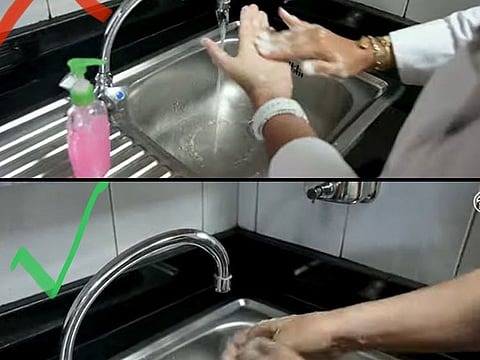COVID-19 combat: Handwashing? Yes. But wasting water? No
Experts say you can waste up to 6 gallons of water a day if you don’t watch out

Dubai: Imagine wasting up to five to six gallons of water every day. Probably you are doing it without realising it while you are preventing the spread of coronavirus by washing hands.
It is more important now than ever to keep washing one’s hands due to the COVID-19 pandemic. However, washing hands with taps continuously on can cause the global health crisis adding to global water crisis as an individual doing so can waste up to five gallons of water a day, experts have warned on Global Handwashing Day.
While using hand sanitisers with at least 60 per cent alcohol is an alternative, health agencies have been encouraging people to wash hands with soap and water as much as possible. There have been global campaigns to raise awareness about clean hands being a major weapon against COVID-19. But, even many officials and celebrities, who took part in the Safe Hands Challenge initiated by the World Health Organisation, were seen letting the water run throughout their handwashing challenge videos.
“In light of the COVID-19 pandemic, millions of people around the world have been urged to wash their hands for a minimum of 20-30 seconds often throughout the day, in order to stay safe from coronavirus infection. This advice comes with good reason and is vital to drastically safeguard communities and reduce transmission of the infection,” said Francois Frigaux, regional sales director, Middle East and North Africa, Sensus, A Xylem Brand.
However, he said, it is important that people remain committed to supporting measures that will contribute towards protecting the world’s most precious resource – water – in the long-term. “The general public can save drastic amounts of water, up to six gallons or 22 litres of water a day, by simply stopping the tap while they lather their hands with soap for 20-30 seconds.”
With countries in the GCC region facing multiple water challenges such as scarcity of natural water resources and a growing gap between demand and available supply, Frigaux said it is important for utilities and the public to be smart about water.
Rami Ghandour, managing director of Metito, said: “Understanding the importance of saving and efficiently using water is always important, but during a pandemic such as the one we find ourselves part of now, it is absolutely crucial. As much as we should practice washing hands frequently using water and soap, there is no better time to think about using water efficiently thereby minimising wastage, so one crisis doesn’t add to another. The very simple, but incredibly important, step of turning off the tap while scrubbing the hands with soap for at least 20 seconds, can save thousands of gallons of water.”
According to Green Matters sustainable consultancy, on average, leaving the water running for the full 20 seconds while scrubbing, one may waste about a quarter of a gallon (0.2 - 0.3 gallons on average) each time a person washes hands. That number is probably closer to half a gallon (0.44 gallons) if the sink has a higher flow rate.
“Assuming everyone is washing their hands at least 10 times daily, that’s between two and five gallons of clean water down the drain each day if you’re not shutting off while scrubbing,” the report said.
In the absence of taps with smart sensors, shutting off the faucet while lathering soap and scrubbing hands thoroughly is the easiest way to prevent this undesirable side effect of our conscious effort to fight pandemic.
Why should we save water?
Dubai’s Integrated Water Resource Management Strategy has adopted a comprehensive approach to ensure the sustainability of water resources that focuses on enhancing water resources, rationalising consumption, and using the latest technologies and innovative solutions to reduce water consumption by 30 per cent by 2030. This supports the vision of His Highness Sheikh Mohammed bin Rashid Al Maktoum, Vice-President and Prime Minister of the UAE and Ruler of Dubai, to enhance the shift towards a sustainable green economy.
The World Resources Institute, a global research non-profit organisation headquartered in the US, said in a report in January 2020 that statistics on global water challenges are daunting.
“Three billion people don’t have basic handwashing facilities. A quarter of the world’s population live in countries facing extremely high water stress. There are more than 500 dead zones — areas of the ocean without enough oxygen for most marine life to survive — from untreated wastewater,” the report said.
Research by WRI projected a 56 per cent deficit in water supply relative to demand by 2030.
According to the UN World Water Development Report released on World Water Day on March 22, 2.2 billion people currently do not have access to safely managed drinking water, and 4.2 billion, or 55 per cent of the world’s population, are without safely managed sanitation.
The report highlighted the fact that poor water management tends to exacerbate the impacts of climate change, not only on water resources but on society as a whole.
The UN Water Analytical Brief on Unconventional Water Resources released in June 2020 said increasing water scarcity is recognised as a key challenge to sustainable development and major cause of conflict,
These studies prove that the age-old adage ‘every drop counts’ holds true more than ever today. It is time for us to preserve it.






